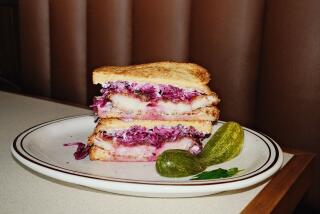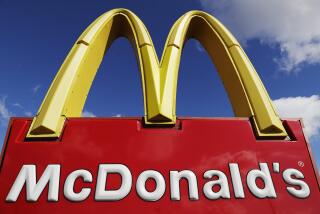A Bagel Market Gone Stale
- Share via
It hasn’t been easy to lose money in the stock market over the last year, but investors in publicly held bagel companies have managed to blow it in one of history’s most out-of-control bull markets.
And they begged for the privilege, having groveled for shares of several bagel joints that went public last summer and fall.
While the Dow Jones industrial average soared more than 40% in the last 12 months, Manhattan Bagel dropped 37%; Einstein/Noah Bagel Corp. fell by more than half; and Quality Dining Inc., owner of Bruegger’s Bagel Bakery, has lost 85%, much of which analysts blame on Quality’s recent decision to dump Bruegger’s--which accounted for about a quarter of its revenue--at a loss.
Such precipitous plunges after overzealous buying by investors often prompt market spectators to start making “buying opportunity” noises. In the case of the apparently unappetizing bagel group, though, it’s tough to drum up any enthusiasm.
“You know what I think? I think it’s over,” says Roger Lipton of Lipton Financial, an investment banking firm that specializes in restaurant franchising. “It’s an easy-entry business--a piece of bread with a hole in it. We’re not talking about a cure for AIDS.”
“It’s a very easy product to put into a retail outlet,” adds Dennis Lombardi of Technomic Inc., a market research firm for the food industry. With monster chains like Dunkin’ Donuts adding bagels to their menus, don’t be looking for robust expansion at the competition, he says.
Signs of a saturated market are certainly a cause of worry. Just a week ago, Einstein/Noah Bagel shares dropped 17% after the company said discount and coupon promotions represented 8.5% of gross sales for the quarter ended July 13--twice the percentage that had been expected. The company also suggested it might slow the pace of expansion next year, disappointing some analysts.
In general, bagels continue to rise in popularity--indeed, cereal companies cut prices across the board last year, citing competition from other breakfast foods, particularly bagels. But more people eating more bagels doesn’t necessarily translate into more successful bagel chains.
The bagel dynasties, of course, see the situation a bit differently. Bagels, they say, have been misunderstood by those who restrict themselves to the bread’s traditionally narrow uses.
“There’s a long way to run with this product unless you consider it just bagels and cream cheese,” says Gary Gerdemann, a spokesman for Einstein/Noah.
Among the factors the Wall Street naysayers are overlooking, in Gerdemann’s view: a promising lunch market for all those noshers of sandwhiches on plain old bread.
Some of the critics were once boosters. Indeed, it was shareholders of Einstein/Noah who in late July sought class-action status for a lawsuit that accuses the company of having a jury-rigged financial structure that let it hide losses. (It’s a charge similar to those made by investors against Boston Chicken, 53% owner of Einstein/Noah). Gerdemann says the company will “vigorously” defend the suit, which it says is without merit. The practices thought by the plaintiffs to be sneaky are in accordance with accepted accounting methods, he says.
Admittedly not in accordance with those high standards, though, were some numbers shown to investors by Manhattan Bagel. In June 1996, the company imparted the rotten news that there had been irregular accounting practices in its Canoga Park I&J; Bagel unit. Manhattan Bagel bought I&J; in June 1995 to create a strong West Coast presence for itself. The bad news arrived six months after the revelation that two executives from the same unit faced felony charges related to the dumping of toxic waste from a business they had owned before entering the bagel business.
The toxic-waste news prompted an analyst at Rodman & Renshaw, Manhattan Bagel’s underwriter, to herald a “buying opportunity” at $17.88. But in June this year, Rodman’s research department downgraded the stock to “neutral” at $6.95--a noteworthy change, especially considering that Rodman has been underwriter for the company.
Equally humiliating, perhaps, for another of the bagel players: The board of directors of Quality Dining voted on May 10 to take a pretax charge of $185 million related to its dumping of the Bruegger’s chain. That news came only 11 months after Quality bought Bruegger’s for $112.9 million in stock, and simultaneous with the cancellation of a campaign to buy back stores from franchisees. Quality Dining had lent $28 million to its chairman to purchase the franchises in the months leading up to the decision to unload the bagel chain.
David Findlay, senior vice president of finance at Quality Dining, said the company had hoped to set up a franchise structure like the one at Boston Chicken, but that the poor financial performance of the bagel units prompted Quality to pull out of both the franchise-buying campaign and the bagel business itself.
Indeed, times are tough enough that all sorts of shuffling of financial arrangements are being revealed to investors who have banked on bagels.
In filings with the Securities and Exchange Commission, Big City Bagels has revealed this year that loan payments to certain officers would be temporarily stopped, that portions of salary payments to certain officers would be held without interest, that two franchisees had been acquired and their debt forgiven, and that certain officers were poised to lend money to the company should the bank account dip too low.
Joe Mansi, a spokesman for Big City, said investors must understand that his client is a debt-free operation in “the embryonic stage”; he said critics should concentrate on the fact that the stock has risen from $2.75 to $5.13 since Jan. 1 --not that it’s dropped from $10 a year ago.
One company’s troubles may help the competition. Lehman Bros. analyst Mitchell Speiser said Bruegger’s woes offer an opportunity to fast-growing Einstein/Noah to gain market share and increased brand identity, and he now rates Einstein a “buy.”
So what’s the lesson? When a craze is on, many investors will gobble up all sorts of things that are bad for them. Be careful what you’re munching on.
(BEGIN TEXT OF INFOBOX / INFOGRAPHIC)
More Hole Than Dough
Stocks of bagel shop companies were popular with investors when they were first issued, but in the last year they have been one of the worst performers in the market. The stocks of the major players, ranked by total-loss percentage for the 12 months ended Friday:
*--*
STOCK Ticker Recent price 12-month % change Quality Dining QDIN 4.56 -85.04% BAB Holdings BAGL 2.63 -65.00% Manhattan Bagel BGLS 6.88 -36.78% Einstein/Noah’s ENBX 11.81 -54.13 Big City Bagels BIGC 5.13 -47.44
*--*
Source: Bloomberg News
More to Read
Inside the business of entertainment
The Wide Shot brings you news, analysis and insights on everything from streaming wars to production — and what it all means for the future.
You may occasionally receive promotional content from the Los Angeles Times.










